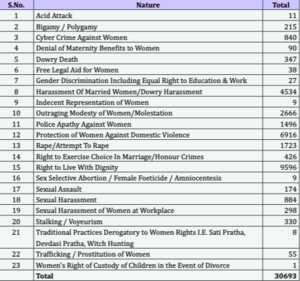National Commission for Women
What is the National Commission for Women?
The National Commission for Women is a statutory body of the Government of India, which chiefly deals with policy matters affecting the welfare of women in India. It was established on 31 January 1992 under the provisions of the Indian Constitution, as defined in the 1990 National Commission for Women Act. The first head of the commission was Jayanti Patnaik. As of 28 May 2024, Rekha Sharma is the chairperson.
The objective of the National Commission for Women is to represent the rights and interests of women, and act as a platform for them to voice their concerns. Subjects of the Commission’s campaigns include dowry, politics, representation of women in the job market, and exploitation of women in the labour force.
Official Definition of the National Commission for Women
A definition for the term “National Commission for Women” has not been codified but the NCW’s official website defines it as “a statutory body in January 1992 under the National Commission for Women Act, 1990 (Act No. 20 of 1990 of Govt. of India) to:
- review the Constitutional and Legal safeguards for women;
- recommend remedial legislative measures;
- facilitate redressal of grievances and
- advise the Government on all policy matters affecting women.”
2.1. Functions
The National Commission for Women is tasked with investigating and examining all matters relating to the constitutional safeguards and other laws that deal with women, which includes delivering reports on working and effective implementation of the safeguards, taking up issues of deprivation of women’s rights or non-compliance with existing protective laws, and reviewing and amending the laws that deal with women and their rights.
Its functions also include raising awareness and conducting research on the condition of women in the country, such as inspections in women’s prisons and other institutions, evaluation of socioeconomic condition and development of women under the Centre and State governments, and recommendations to improve the same, among others.

2.2. State Women’s Commissions
State Women’s Commissions are constituted under the respective state acts in the various states and union territories of India. Their functions are similar to those of the NCW.
Some of the states and union territories that have their own commissions for women are Andhra Pradesh, Assam, Bihar, Chhattisgarh, Delhi, Goa, Gujarat, Haryana, Himachal Pradesh, Jammu and Kashmir, Jharkhand, Karnataka, Kerala, Madhya Pradesh, Maharashtra, Manipur, Meghalaya, Mizoram, Nagaland, Odisha, Punjab, Rajasthan, Sikkim, Tamil Nadu, Telangana, Tripura, Uttar Pradesh, Uttarakhand and West Bengal.
The official website, ncw.nic.in contains a list of the states and territories with State Women’s Commissions and details about them, including their members and contact details.

3. Appearance in Official Databases
3.1. Ncwapps.nic.in




Website developed by NCW, as an auxiliary to the official website, in order to make data about case filings and registration procedures more accessible.
4. Research that engages with NCW
4.1. Lok Sabha Report- Working of National Commission for Women and State Commissions for Women
This report by the Standing Committee on Empowerment of Women was given in the 17th Lok Sabha, and engaged with various issues relating to the NCW Act and State Commissions established under it. Key recommendations include:
- A review of the National Commission for Women Act, 1990, to make it more independent and effective, as well as more accountable.
- It noted that many of the State Commissions for Women were defunct or poorly functioning, and recommended establishing a statutory linkage of the Commissions to ensure smoother coordination.
- It also recommended the establishment of a timeframe by bodies such as the Ministry of Women and Child Development, Ministry of Law and Justice, etc. for implementation of NCW recommendations and amendments.
- It addressed staff shortages and advised filling up positions towards remedying the same.
- The report recommended improving the helplines and grievance redressal mechanisms currently in place by (i) streamlining the procedure, (ii) having an efficient workforce, and (iii) coordinating with concerned agencies. Furthermore, it noted the potential of linking the 24/7 helpline with the NCW Women’s helpline, and suggested making the numbers easier to remember.
- Lastly, it recommended (i) entering into Mutual Legal Assistance Treaties with more countries, (ii) a database on harassment and duping cases for public awareness, (iii) establishing a one-stop centre for legal and psychological counselling in coordination with Indian Missions, and (iv) enhancing the financial assistance under the Indian Community Welfare Fund to help women who had been abandoned by their NRI/Overseas husbands.
